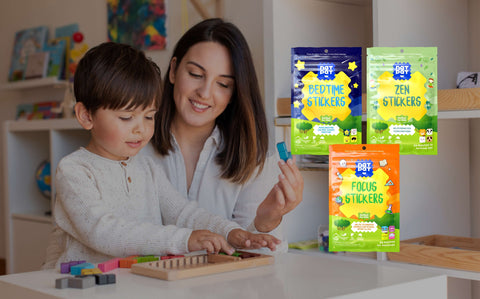Sleep. It’s something we all need to help make our bodies go around. We literally rely on sleep to reset our brains and bodies daily to keep up with what life has in store. Lose sleep, lose concentration, stamina, focus. The list goes on. Get the right amount of sleep, and we can achieve anything we set out to do.
So how do we get this sleep? Melatonin. It’s what our bodies create and use to get us sleeping faster and staying asleep longer. What happens when our bodies can’t create this essential sleep ingredient?
We need to replace it.
But, How Should We Replace It?
We sound like the kids with all these questions, we know. However, these are important questions we need to ask ourselves as well as answer when we aren’t getting the sleep we need. This is the same requirement our kids also need since we know what our nights are like when they don’t sleep.
So that’s what we are here to do today. Answer these essential questions about melatonin and how you can replace it when your body doesn’t make enough. But here at The Natural Patch Co., we are all about doing things naturally.
So we want to introduce you to natural alternatives to melatonin. Lastly, we want to give you a few tips and tricks to help the whole family sleep soundly tonight.
What Is Melatonin?
The best way to describe melatonin is that it’s a hormone. It’s something that your body naturally creates in response to it getting dark outside. Internally, we all have a 24-hour clock, known as a circadian rhythm. This “clock” keeps us on our natural sleep habits and lets us fall asleep naturally.
A lot of different factors can affect our body's ability to create this hormone. In adults, working hours, children, relationships, and obligations can all alter our ability to make melatonin. For children, inconsistent bedtimes, heavy stimulation, improper nutrition are all factors that can keep them up. Once our body's internal clock gets off schedule, our bodies will stop making melatonin, and then we have trouble sleeping.
What This Means and Why This Matters
When our bodies aren’t able to make melatonin in their regular routine, our sleep gets thrown off course. This lack of sleep could be temporary, and it might only take a few days to get back on track. Or it could be more long-term, and you start to suffer from insomnia.
Regardless of how long the issue lasts, lack of sleep is unhealthy for ourselves and our children. We need to aid our bodies in finding ways to fall asleep when we lack essential melatonin.
Why We Go Natural
There are plenty of melatonin sleep aids on the market, so why don’t we just recommend those? For starters, sleep aids aren’t always FDA regulated. A product can come to market without proper regulations and studies if it is all-natural. This means that these products aren’t monitored for safety, which is a significant concern with products we ingest.
Another issue is that there are minimal studies conducted on the safety and efficacy of children. Many of the gummies on the market are geared toward parents desperate for sleep. But the testing isn’t as extensive as parents would like to ensure our child is safe when taking these supplements.
Lastly, these melatonin supplements can interfere with our body's natural ability to produce melatonin — meaning that we may become dependent on the supplement to effectively find enough power to sleep. This is bad enough for ourselves, but consider the impact this could have on our kids.
Eight Natural Melatonin Alternatives
Next, we want to go over the eight best alternatives to melatonin. Instead of reaching for a gummy full of fake melatonin the next time your family has trouble getting to sleep, try these.
Sleep Mask
As we said before, our bodies begin to ramp up melatonin creation when the day transitions into night. However, problems can arise if our rooms or homes are brighter than average and our bodies get confused. So, when it’s time for bed, no matter the hour, add a sleep mask to your routine.
The sleep mask will make it dark enough for your eyes/body that your brain will start to get in gear. It will be like the lightbulb that clicks when we have a good idea. Your brain will note the dark and begin to produce your own blend of sleep aid.
Tea
Chamomile or other herbal teas are a good way to get ready for bed. Kids might not be all that into tea, so try a warm glass of milk. The various herbs in tea can calm your body and nerves to put you in the perfect state to fall asleep. Similarly, milk contains a variety of amino acids that provide the building blocks your child's body needs to sleep.
In both cases, the goal is to get you to chill. Relaxing enough to get in a good mindset for sleep isn’t always easy (for our kids or us). Teas and warm milk help us chill out and get in the mood for sleep.
Magnesium
Magnesium is a mineral found in our bodies that keeps our hearts and brains healthy. It helps our bodies naturally produce melatonin. So ensuring that we have enough magnesium in our diet ensures we have enough melatonin-producing minerals. In addition, a magnesium deficiency can contribute to insomnia and an inability to stay asleep.
What does this all mean? Sufficient magnesium means our bodies can produce enough melatonin and reach higher levels of calm.
The best part? Whole grains, legumes, and dark leafy greens all provide ample amounts of magnesium for our bodies. We know spinach can be a tough sell to our littles, but Popeye will be so proud.
Lavender
Essential oil lavender has a calming effect on the body. Many times when our bodies have trouble falling asleep, it can be from our brains not being able to shut off. Lavender can induce a peaceful calm that will allow us to fall asleep faster.
There are a few ways to use lavender oils, but having them close to you or your kids while you sleep is best. This can usually mean using lotions or putting oils directly onto the skin. With kids, we know this can prove to be difficult as they’ll wipe them off or be irritated with the texture of their skin. Be ready for a wrestling match if this sounds familiar.
SleepyPatch
What’s better than trying to fight our kids to wear lotions or take supplements like melatonin? Cute and fun to wear stickers that promote healthier sleeping habits:
Our SleepyPatch is an all-natural blend of essential oils that help your body get ready for sleep and stay that way. The delightful blend of sweet marjoram, vetiver, lavender, and mandarin oils is the perfect way to get your body calm and ready for a long night of zzz’s.
The best part? Our patches go on clothes, not on skin. The medical-grade material releases oils about every 30 seconds to ensure that you and your kids will be able to stay in the right state to sleep all night. And your kids won’t be bothered by anything touching their skin.
Other Things to Keep in Mind
These are the best natural alternatives to trying melatonin supplements for your family. But there are other steps you can — and should — take to get your body in the right routine for nighttime.
Proper Bedtime Routine
Kids need a proper bedtime routine to get the right sleeping habits intact. This will benefit us as parents as well by giving us the proper time to settle down after the fourth or fifth drink of water our kids need. Kids need the right amount of sleep to be in the best position to learn and grow.
Ensuring their nighttime routine early and consistently will allow their brains to learn the rhythm and provide the right amount of melatonin at the right time.
Adequate Exercise
Taking advantage of the day will get all the energy out before nighttime. Being physically tired at the end of the day is the right way to let your brain know it’s almost time to turn off.
Daily walks and adequate exercise ensure that you get out the energy you store while sleeping. If your energy levels are empty by the end of the day, your body and brain know it’s time to recharge.
Proper Hydration
Staying hydrated boosts our bodies in more ways than one. One of those ways is keeping our minds healthy and adequately charged. Hydration intake keeps our bodies healthy so that we can stay active all day without crashing.
This is an essential part of our brain function to regulate between night and day. Those little naps that become necessary after lunch mess with our body trying to regulate when to sleep and be awake.
Let Your Brain Do the Work
Bottom line: Help your brain make the proper melatonin you need by keeping your body healthy. We are confident that the information, tips, and tricks we provided here today are the tools you’ll need to replace melatonin naturally.
Melatonin is a hormone that your body produces, so replacing it with supplements can get risky. Instead, give yourself and your family the natural building blocks you need for your brain to get back on track.
Sources:
9 Natural Sleep Aids: Melatonin & More, Benefits, Risks | Healthline
Melatonin: What You Need To Know | NCCIH
There's more than melatonin to get kids to sleep | Chicago Tribune


